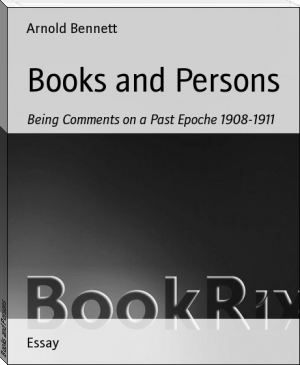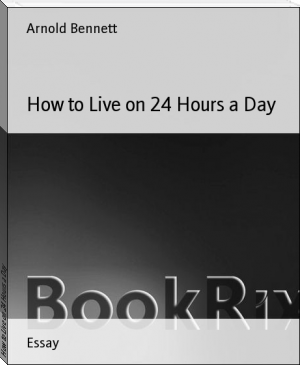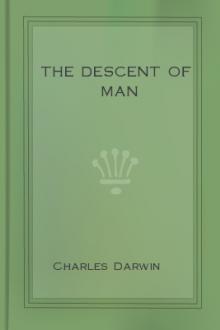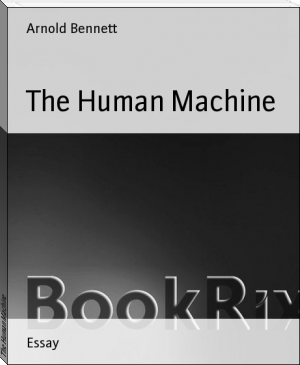Books and Persons - Arnold Bennett (phonics readers .TXT) 📗

- Author: Arnold Bennett
Book online «Books and Persons - Arnold Bennett (phonics readers .TXT) 📗». Author Arnold Bennett
TO
HUGH WALPOLE
PREFATORY NOTE
The contents of this book have been chosen from a series of weekly articles which enlivened the _New Age_ during the years 1908, 1909, 1910, and 1911, under the pseudonym "Jacob Tonson." The man responsible for the republication is the dedicatee, who, having mysteriously demanded from me back numbers of the _New Age_, sat in my house one Sunday afternoon and in four hours read through the entire series. He then announced that he had made a judicious selection, and that the selection must positively be issued in volume form. Mr. Frank Swinnerton approved the selection and added to it slightly. In my turn I suggested a few more additions. The total amounts to one-third of the original matter. Beyond correcting misprints, softening the crudity of several epithets, and censoring lines here and there which might give offence without helping the sacred cause, I have not altered the articles. They appear as they were journalistically written in Paris, London, Switzerland, and the Forest of Fontainebleau. In particular I have left the critical judgments alone, for the good reason that I stand by nearly all of them, though perhaps with a less challenging vivacity, to this day.
ARNOLD BENNETT
February 1917
CONTENTS
1908
WILFRED WHITTEN'S PROSE
UGLINESS IN FICTION
LETTERS OF QUEEN VICTORIA
FRENCH PUBLISHERS
WORDSWORTH'S SINGLE LINES
NOVELISTS AND AGENTS
THE NOVEL OF THE SEASON
GERMAN EXPANSION
THE BOOK-BUYER
JOSEPH CONRAD AND THE _ATHENAEUM_
THE PROFESSORS
MRS. HUMPHRY WARD'S HEROINES
W.W. JACOBS AND ARISTOPHANES
KENNETH GRAHAME
ANATOLE FRANCE
INTIMATIONS OF IMMORTALITY
MALLARME, BAZIN, SWINBURNE
THE RUINED SEASON
1909
"ECCE HOMO"
HENRY OSPOVAT
FRENCH AND BRITISH ACADEMIES
POE AND THE SHORT STORY
MIDDLE-CLASS
THE POTENTIAL PUBLIC
H.G. WELLS
TCHEHKOFF
THE SURREY LABOURER
SWINBURNE
THE SEVENPENNIES
MEREDITH
ST. JOHN HANKIN
UNCLEAN BOOKS
LOVE POETRY
TROLLOPE'S METHODS
CHESTERTON AND LUCAS
OFFICIAL RECOGNITION OF POETRY
ARTISTS AND CRITICS
RUDYARD KIPLING
CENSORSHIP BY THE LIBRARIES
1910
CENSORSHIP BY THE LIBRARIES
BRIEUX
C.E. MONTAGUE
PUBLISHERS AND AUTHORS
TOURGENIEV AND DOSTOIEVSKY
JOHN GALSWORTHY
SUPPRESSIONS IN "DE PROFUNDIS"
HOLIDAY READING
THE BRITISH ACADEMY OF LETTERS
UNFINISHED PERUSALS
MR. A.C. BENSON
THE LITERARY PERIODICAL
THE LENGTH OF NOVELS
ARTISTS AND MONEY
HENRI BECQUE
HENRY JAMES
ENGLISH LITERARY CRITICISM
MRS. ELINOR GLYN
W.H. HUDSON
NEO-IMPRESSIONISM AND LITERATURE
1911
BOOKS OF THE YEAR
"THE NEW MACHIAVELLI"
SUCCESS IN JOURNALISM
MARGUERITE AUDOUX
JOHN MASEFIELD
LECTURES AND STATE PERFORMANCES
A PLAY OF TCHEHKOFF'S
SEA AND SLAUGHTER
A BOOK IN A RAILWAY ACCIDENT
"FICTION" AND "LITERATURE"
1908
WILFRED WHITTEN'S PROSE
[_4 Apr. '08_]
An important book on an important town is to be issued by Messrs. Methuen. The town is London, and the author Mr. Wilfred Whitten, known to journalism as John o' London. Considering that he comes from Newcastle-on-Tyne (or thereabouts), his pseudonym seems to stretch a point. However, Mr. Whitten is now acknowledged as one of the foremost experts in London topography. He is not an archaeologist, he is a humanist--in a good dry sense; not the University sense, nor the silly sense. The word "human" is a dangerous word; I am rather inclined to handle it with antiseptic precautions. When a critic who has risen high enough to be allowed to sign his reviews in a daily paper calls a new book "a great human novel," you may be absolutely sure that the said novel consists chiefly of ridiculous twaddle. Mr. Whitten is not a humanist in that sense. He has no sentimentality, and a very great deal of both wit and humour.
* * * * *
He is also a critic admirably sane. Not long ago he gave a highly diverting exhibition of sanity in a short, shattering pronouncement upon the works of Mr. Arthur Christopher Benson and the school which has acquired celebrity by holding the mirror up to its own nature. The wonder was that Mr. Benson did not, following his precedent, write to the papers to say that Mr. Whitten was no gentleman. In the days before the _Academy_ blended the characteristics of a comic paper with those of a journal of dogmatic theology, before it took to disowning its own reviewers, Mr. Whitten was the solid foundation of that paper's staff. He furnished the substance, which was embroidered by the dark grace of the personality of Mr. Lewis Hind, whose new volume of divagations is, by the way, just out.
* * * * *
But my main object in referring to Mr. Whitten is to state formally, and with a due sense of responsibility, that he is one of the finest prose writers now writing in English. His name is on the title-pages of several books, but no book of his will yet bear out my statement. The proof of it lies in weekly papers. No living Englishman can do "the grand manner"--combining majestic dignity with a genuine lyrical inspiration--better than Mr. Whitten. These are proud words of mine, but I am not going to disguise my conviction that I know what I am talking about. Some day some publisher will wake up out of the coma in which publishers exist, and publish in volume form--probably with coloured pictures as jam for children--Mr. Whitten's descriptions of English towns. Then I shall be justified. I might have waited till that august moment. But I want to be beforehand with Dr. Robertson Nicoll. I see that Dr. Nicoll has just added to his list of patents by inventing Leonard Merrick, whom I used to admire in print long before Dr. Nicoll had ever heard that Mr. J.M. Barrie regarded Leonard Merrick as the foremost English novelist. Dr. Nicoll has already got Mr. Whitten on to the reviewing staff of the _Bookman_. But I am determined that he shall not invent Mr. Whitten's prose style. I am the inventor of that.
[_2 May '08_]
A few weeks ago I claimed to be the discoverer of Mr. Wilfred Whitten as a first-class prose writer. I relinquish the claim, with apologies. Messrs. Methuen have staggered me by sending me Mrs. Laurence Binyon's "Nineteenth Century Prose," in which anthology is an example of Mr. Whitten's prose. Though staggered, I was delighted. I should very much like to know how Mrs. Binyon encountered the prose of Mr. Whitten. Did she hunt through the files of newspapers for what she might find therein, and was she thus rewarded? Or did some tremendous and omniscient expert give her the tip? I disagree with about 85 per cent. of the _obiter dicta_ of her preface, but her anthology is certainly a most agreeable compilation. It shows, like sundry other recent anthologies, the strong liberating influence of Mr. E.V. Lucas, whose "Open Road" really amounted to a renascence of the craft.
And here is the tail-end of the extract which Mrs. Binyon has perfectly chosen from the essays of Mr. Whitten:
"...The moon pushing her way upwards through the vapours, and the scent of the beans and kitchen stuff from the allotments, and the gleaming rails below, spoke of the resumption of daily burdens. But let us drop that jargon. Why call that a burden which can never be lifted? This calm necessity that dwells with the matured man to get back to the matter in hand, and dree his weird whatever befall, is a badge, not a burden. It is the stimulus of sound natures; and as the weight of his wife's arm makes a man's body proud, so the sense of his usefulness to the world does but warm and indurate his soul. It is something when a man comes to this mind, and with all his capacity to err, is abreast of life at last. He shall not regret the infrequency of his inspirations, for he will know that the day of his strength has set in. And if, for poesy, some grave Virgilian line should pause on his memory, or some tongue of Hebrew fire leap from the ashes of his godly youth, it will be enough. But if cold duck await--why, then, to supper!"
UGLINESS IN FICTION
[_9 May '08_]
In the _Edinburgh Review_ there is a disquisition on "Ugliness in Fiction." Probably the author of it has read "Liza of Lambeth," and said Faugh! The article, peculiarly inept, is one of those outpourings which every generation of artists has to suffer with what tranquillity it can. According to the Reviewer, ugliness is specially rife "just now." It is always "just now." It was "just now" when George Eliot wrote "Adam Bede," when George Moore wrote "A Mummer's Wife," when Thomas Hardy wrote "Jude the Obscure." As sure as ever a novelist endeavours to paint a complete picture of life in this honest, hypocritical country of bad restaurants and good women; as sure as ever he hints that all is not for the best in the best of all possible islands, some witling is bound to come forward and point out with wise finger that life is not all black. I once resided near a young noodle of a Methodist pastor who had the pious habit of reading novels aloud to his father and mother. He began to read one of mine to them, but half-way through decided that something of Charlotte M. Yonge would be less unsuitable for the parental ear. He then called and lectured me. Among other aphorisms of his which I have treasured up was this: "Life, my dear friend, is like an April day--sunshine and shadow chasing each other over the plain." That he is not dead is a great tribute to my singular self-control. I suspect him to be the _Edinburgh_ Reviewer. At any rate, the article moves on the plane of his plain.
* * * * *
The Reviewer has the strange effrontery to select Mr. Joseph Conrad's "Secret Agent" as an example of modern ugliness in fiction: a novel that is simply steeped in the finest beauty from end to end. I do not suppose that the _Edinburgh Review_ has any moulding influence upon the evolution of the art of fiction in this country. But such nonsense may, after all, do harm by confusing the minds of people who really are anxious to encourage what is best, strongest, and most sane. The Reviewer in this instance, for example, classes, as serious, Thomas Hardy, Joseph Conrad, and John Galsworthy, who are genuine creative forces, with mere dignified unimportant sentimentalizers like Mr. W.B. Maxwell. While he was on the business of sifting the serious from the unserious I wonder he didn't include the authors of "Three Weeks" and "The Heart of a Child" among the serious! Perhaps because the latter wrote "Pigs in Clover" and the former was condemned by the booksellers! Nobody could have a lower opinion of "Three Weeks" than I have. But I have never been able to understand why the poor little feeble story was singled out as an awful example of female licentiousness, and condemned by a hundred newspapers that had not the courage





Comments (0)